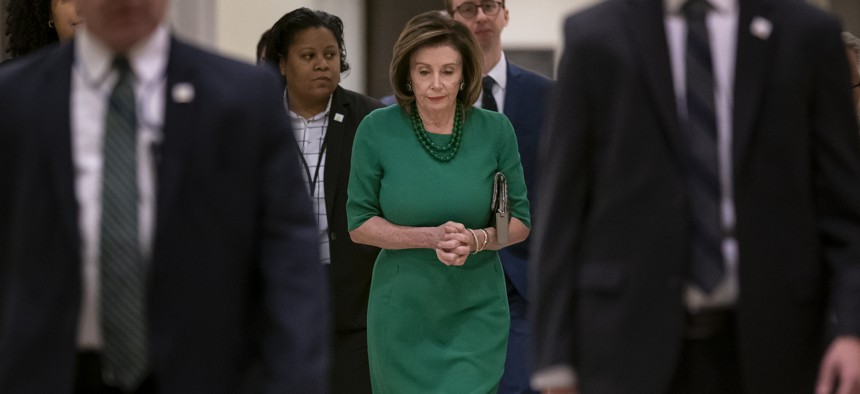Democrats, Republicans Race to Shore Up Divisions on Coronavirus Package

Flanked by her security detail and aides, Speaker of the House Nancy Pelosi, D-Calif., arrives to update reporters as lawmakers continue work on a coronavirus aid package, on Capitol Hill in Washington, Thursday, March 12, 2020. AP Photo/J. Scott Applewhite
House Speaker Nancy Pelosi had hoped for a Thursday vote on the legislation, but Republicans said they won’t support the proposal as drafted and pushed for changes.
House Democrats and the Trump administration worked Thursday to iron out disagreements about emergency legislation to address economic fallout from the coronavirus as concerns mounted about the spread of the outbreak.
Discussions between House Speaker Nancy Pelosi and Treasury Secretary Steven Mnuchin continued throughout the day Thursday after Republicans raised opposition to some of the key provisions in the Democratic proposal.
Democrats’ plan would offer food aid, create an “emergency paid leave” program and beef up unemployment help for those who lose work because of the outbreak.
“He had some suggestions, all very reasonable, I think that none of them would prevent us from moving forward with the bill,” said Pelosi, a California Democrat, at a Thursday morning press conference. “When we pass a bill we will make a judgment about what comes next.”
While Pelosi initially said a vote would go forward Thursday, Republican congressional leaders said they rejected the measure as drafted. A senior Democratic aide on Thursday said negotiations were continuing but there was no set timeline for a vote.
President Trump said Thursday he would not back the bill because “there are things in there that have nothing to do with what we are talking about.” House Minority Leader Kevin McCarthy also expressed opposition, although he emphasized that he thought a compromise could be achieved within the next 24 to 48 hours.
While Pelosi resisted the idea of waiting, saying extended negotiations were not necessary, Senate Majority Leader Mitch McConnell announced he would cancel next week’s congressional recess as talks continue.
“I hope Congress can pass bipartisan legislation to continue combating the coronavirus and keep our economy strong," he wrote on Twitter.
Democrats introduced their proposal late Wednesday. It includes:
- $1 billion to address food insecurity due to the outbreak. Extra funding would be put towards the food stamps program targeting pregnant women or mothers of young children who lose their jobs, and assisting local food banks.
- An emergency paid leave program that workers could tap into if they have to take extended time off due to infection or quarantine due to the coronavirus outbreak. Eligible workers could receive up to two-thirds of their monthly salary for up to one month if they have to take at least 14 days off of work and are unpaid.
- $1 billion in emergency grants for states to pay for processing and paying unemployment insurance benefits.
- Free testing for coronavirus. Health insurance providers and government programs including Medicaid and Medicare would be required to cover the cost of testing as well as the cost of any associated provider or emergency room visits to receive testing.
“People are concerned about their health and the health of their children. If they are losing their jobs because no one is coming to the restaurant or whatever it is, we have to be there with some help for them,” Pelosi said. “If their children can’t go to school because the school closed well then this legislation affords them the opportunity to stay home on somewhat of paid leave.”
Among the concerns voiced by Republicans were their lack of input in the proposal and criticisms of the paid sick leave provisions.
“Unfortunately, Speaker Pelosi’s first draft from late last night was off-base,” wrote McConnell on Twitter. “It does not focus immediate relief on affected Americans. It proposes new bureaucracy that would only delay assistance. It wanders into policy areas that are not related to the pressing issues at hand.”
McCarthy said Republican members were concerned that the sick leave provisions included in the bill would take too long to get up and running, while also not providing exemptions for businesses. He said Republicans were looking for inclusion of other provisions such as an employee retention credit, or a designation that would make public health emergencies eligible for certain disaster relief programs that already exist.
“We are going to work to make this right,” McCarthy said.
OTHER STORIES on Route Fifty:
Andrea Noble is a staff correspondent for Route Fifty.
NEXT STORY: The Startling Inequality Gap That Emerges After Age 65





